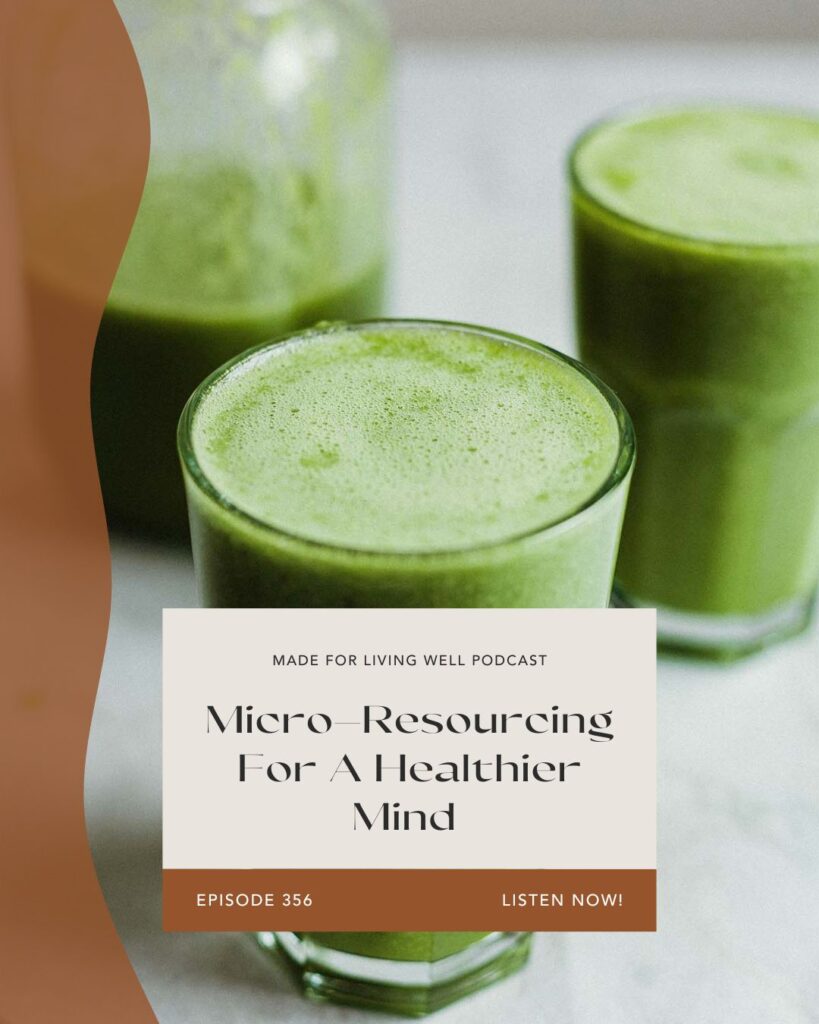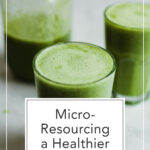
Listen on iTunes | Listen on Spotify | Listen on YouTube | Review the Podcast
A healthier mind doesn’t start with healthier thoughts. It happens through nourishing your body – your body builds your thoughts. Learn how to use micro-resourcing to change your thoughts.
The last thing you want to hear when you’re struggling mentally is to “do more” or “try harder.” At least, that’s how I used to feel.
When your mind is already gasping for air, being told to add more to your plate can feel like the final blow. Yet at the same time, you want to feel better, creating a frustrating paradox—too overwhelmed to take action but desperate for relief.
I know that space well. I lived in it. And the shift didn’t happen when I mustered up enough energy to push through one more strategy. It happened when I started to understand why my mind was struggling in the first place.
The Mind-Body Connection
Over the years, I spent time in therapy, determined to feel better. I did the work, but the relief I expected never fully came. It confused me because I didn’t have major trauma (what many call “big T” trauma). Instead, I had accumulated “small t” traumas—yet I still couldn’t get my mind to function the way I wanted.
I was floundering, searching for answers. That’s when I started studying the connection between the body and mind—their deep, energetic interplay. And what I learned changed everything, including my belief that you can “think yourself healthy.”
For years, I clung to the idea that mindset alone could fix everything. If I couldn’t heal, I figured it was because I was broken. But the truth is, changing your mind is only possible when your body has the resources and capacity to support that change.
Your mind and body aren’t separate; they function in a loop. If your body is depleted, your mind struggles. If your mind is stressed, your body suffers. It’s not a chicken-or-egg situation—it’s personal to each of us. Understanding this connection is the key to shifting your mental state.
In my latest podcast episode, I explore this in depth, including what the Minnesota Starvation Experiment revealed about how nutrient depletion affects mental health. It’s a must-listen.
Your Mind Needs a Resourced Body
Your mind reflects the state of your body. If you’re feeling anxious, depressed, overwhelmed, or stuck in compulsive behaviors, the issue may not be your willpower—it may be that your body lacks the resources to function optimally.
Think about survival: If your body is under-resourced, why wouldn’t your brain struggle?
Your mind generates your actions based on how safe and supported your body feels. That sense of safety is influenced by your biological state—how nourished, hydrated, and rested you are. When your body has what it needs, your perception of reality shifts. You think differently. You act differently.
This is the foundation of resilience (and a healthier mind)—having the strength and capacity to handle what life throws at you.
Change requires capacity.
Breaking the Cycle + Building a Healthier Mind
To break the cycle of stress, depletion, and being overwhelmed, you have to do something different. And that starts with resourcing your body.
This doesn’t mean neglecting your thoughts. It means recognizing that engaging with them effectively requires energy. Without capacity, even the best mindset shifts won’t stick.
The Minnesota Starvation Experiment proved how drastically nutrient intake affects thought patterns, behavior, personality, and emotions. If food alone can alter mental health so significantly, imagine what consistent resourcing could do for you.
If you’ve been looking for a sign, this might be it. Your struggles may not be a character flaw or a lack of discipline. They may simply be a lack of resources.
Micro-Resourcing: Small Actions, Big Impact
An overwhelmed mind sees everything as overwhelming. But when you understand this, you can work with your brain instead of being controlled by it.
When I feel anxious, I remind myself that adding one small thing to my routine isn’t adding to the chaos—it’s helping reduce it. Instead of focusing on why I’m overwhelmed, I ask:
What is one thing I can do right now to support my body?
That one action is often enough to shift me out of a spiral. But you have to see it as help, not just another task. It’s something you do—and once you do it, you feel the difference.
Less thinking, more doing.
When you give your body resources, it generates energy. That energy fuels your mind, shifting your entire state.
Think of it like moving furniture. If you’re exhausted, even a simple task feels impossible. But when you’re well-rested and strong, the same task becomes manageable—even easy. Resourcing is that extra strength. It’s energy. It’s vitality. And vitality changes everything.
Your Next Step: Micro-Resourcing For A Healthier Mind
The best time to resource your body is before you hit a spiral. But if you’re already there, start small. Pick one thing.
Here are 10 micro-resourcing actions that have a lasting impact:
- 5 minutes of sunlight (any time of day)
- A short walk around the block
- Dancing to your favorite song
- A glass of water with citrus juice or a pinch of salt
- Eating a nourishing meal
- Taking a 15-minute nap
- Breathing deeply for 60 seconds
- Stretching or gentle movement
- Laughing (watch a funny video, call a friend)
- Writing down one thing you’re grateful for
Life isn’t just what happens to you. It’s how you respond to what happens. And how you respond is directly tied to how well you resource your body.
So start today. Give your body what it needs. And watch your mind follow. You’ll be amazed at what can change in your thought patterns when you provide what your body needs.
A healthier mind starts with a healthier body.
